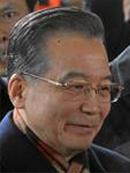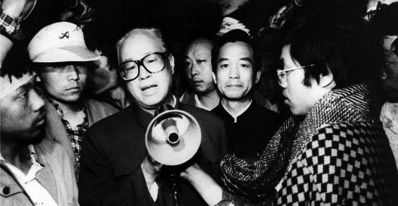 Name
Name
Wen Jiabao 温家宝
Current status
Retired
Born
1942
Relevance to Tibet
Retired from the Politburo Standing Committee in 2012 and as Premier of State Council in March 2013.
 Name
Name
Wen Jiabao 温家宝
Current status
Retired
Born
1942
Relevance to Tibet
Retired from the Politburo Standing Committee in 2012 and as Premier of State Council in March 2013.
Pronunciation: One Jeeyah-bow (as in how) Soundbite
Born: 1942, Tianjin.
Education: Beijing Institute of Geology.
Career: 20 years in Gansu Province. A protégé of Hu Yaobang, Wen survived an association with opponents of the hard-line response to Tiananmen protests.
Prospects: Retired from Politburo Standing Committee and State Council.
Relevance to Tibet: May retain some influence over future promotions and policy, but less than Hu Jintao.
Wen, assisted by four Vice Premiers, was Chair of the State Council (or Cabinet) to whom the Ministry and Department Heads report, until March 2013. Wen Jiabao had broad areas of responsibility, especially the economy, agriculture and the environment.
As with Hu Jintao, Wen is part of the “populist” school, more interested in reducing economic disparity than in economic growth at all costs.
He is considered to be a liberal thinker but simultaneously a close follower of the Party line.
Wen has been a regular verbal proponent of political reform, but there is little evidence that he has been able to implement change. Examples of his speeches on this topic include August 2010, when he called for political reform, arguing that without such reform, China’s decades of impressive economic growth would be lost. He also called for mechanisms to allow citizens to criticize and supervise the Communist Party. Since the Hu-Wen administration has been silent on political reform, Wen’s speech unleashed considerable speculation. Was this a genuine call for political reform? Have such speeches been Wen’s effort to burnish his legacy in his last two years of office? Did they reflect some hidden split in the Politburo?
Wen spent almost 20 years in Gansu Province, with increasingly more responsible positions in both geologic work and Party activity.
His talent was recognized in the early 1980s by Hu Yaobang, who gave him a “helicopter ride” promotion to the Central Committee in Beijing as the deputy in the Party’s Central Office.
In the Party’s history, he is the only Politburo Standing Committee member to have served four General Secretaries (Hu Yaobang, Zhao Ziyang, Jiang Zemin and Hu Jintao, two of whom were purged).
It remains unclear how his reputation was not damaged when he served as a top aide to Zhao Ziyang, who opposed the hard-line response to Tiananmen protests. (Forbes, June 2009)
On 24 January 2011, Wen visited the Beijing petition office; a visit that “was seen as extraordinary for a senior Chinese leader” according to the Washington Post. The Post went on, “He mingled with the petitioners and urged officials to handle citizen complaints promptly, seriously and in a personal way.”

Iconic photo: May, 1989, Wen second from right, with Zhao Ziyang in tears, pleading with students to leave Tiananmen Square.